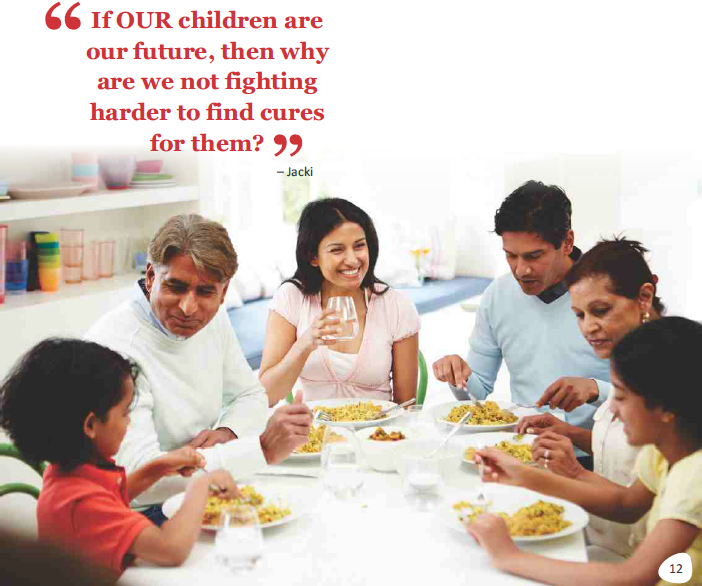Coping with Childhood Leukemia and Lymphoma
Anyone can be diagnosed with cancer; it does not spare the old or the young. It is indeed very sad and painful to see a child been diagnosed and treated for blood cancer. A child suffers a lot due to the symptoms of cancer itself and all the more due to the side effects of cancer treatment. It is not easy for a child to live with cancer, as the child will face a lot of pain, fear, anxiety, emotional disturbances, discomfort, difficulties and hardships while they go through the treatment. A child is totally dependent on others, so it is our responsibility as parents and caregivers to help the child cope and fight against cancer and do all that we can, to help them live longer. We must do our best and the maximum we can to destroy the cancer completely through treatment, save the life of a child, make their life better, and help them live a normal life to the fullest. This section will guide you in helping the child to cope with the diagnosed blood cancer.

Nutrition for children
Nutrition is important for the normal growth and development of all children, but it is especially important for children getting cancer treatment. Children undergoing cancer treatment need even
more calories for tissue healing and energy. Eating the right foods before, during, and after the treatment can help a child feel better and stay stronger.
Tips if eating is difficult
If your child experiences changes in taste and smell, some of these tips below may help you:
- Serve foods cold or at room temperature to decrease the foods’ tastes and smells.
- Reduce food smells by covering drinks and making your child drink through a straw.
- Don’t cook foods with strong odors when your child is around, and avoid eating in rooms that are stuffy or too warm.
- If your child has a metallic taste in the mouth, using plastic flatware, glass cups, and plates may help.
- Fresh fruits can be blended into shakes, smoothies, ice creams, or yogurt.
- Rinsing and brushing your child’s mouth regularly can help foods taste better.
If your child’s appetite is affected, it may cause weight loss, weakness, and fatigue. Tips to increase your child’s food intake are as follows:
- Children can be a little fussy about the food and can have poor eating habits, so avoid scolding, nagging, or punishing your child for not eating. Try to understand the phase through which they are going, and remember that it is not easy for them. Also, try to distract them with their favorite toys, and involve them in activities during meals, which can make your child have their meals.
- Make mealtimes fun by playing your child’s favorite music, watching television, having your child’s friends around, and using pretty dishes to have food.
- You can engage your child in fun activities, such as reading, drawing, painting, doing crafts, and solving puzzles.
- Let your child help you in cooking food and preparing the food shopping lists.
- Let your child eat his/her favorite foods at any time of the day.
If your child has a sore throat, which possibly could be due to the cancer treatment, the following tips could help in giving some comfort to the child while eating:
- Try soothing things, such as soft, bland, and cool food.
- If your child can’t eat regular foods, try milk, ice cream, homemade shakes, or smoothies.
- Make soft, creamy foods, such as cream soups, mashed potatoes, yogurt, custards, puddings, and cooked cereals for your child. Dry or solid food can be blended and moistened. You can puree foods in a blender to make them easier to swallow.
- Try using a straw to bypass mouth sores.
- Avoid acidic, salty, rough, or hard food.

Tips to help the child cope up with the distress and discomfort of Blood Cancer
- Inform the child about the illness and treatment. This information will build their trust in you and the treating team, make them comfortable to share their fears and concerns, and also help your child to cooperate and get through difficult situations.
- If the child expresses strong feelings, such as anger or sadness about the diagnosis, then tell them that it is fine to express their emotions.
- Respect and understand the child’s feelings of anger, sadness, worry, or fear.
- Accept and praise the child when he/she does things that are hard or difficult.
- Allow the child to express his/her feelings (eg, let the child draw, make up stories, and keep a diary to express his/her feelings and fears).
- Tell the child that he/she will never be alone and will always be supported.
- Help the child to understand that the doctors and nurses are trying their best to help him/her get well, even though the things done by the medical team may cause discomfort for a while.
Make phone calls to the child’s loved ones, show photos of his/her interests, or arrange visits from friends when the child wishes to do so. - If possible, request the child’s favorite teacher to make a personal phone call, send a note, or visit the child, so that the child feels good.
- Give the child a chance to make choices (eg, let the child decide which pill to take first, what food he/she would like to eat, or movies or books he/she would like to watch or read).
- Children usually fear medications, chemotherapy, and needle pokes. Try to keep the child busy and distract him/her with enjoyable activities to reduce his/her fears and nervousness related to the treatment.













